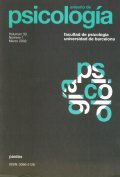Inferencias bayesianas:una revisión teórica
Paraules clau:
Heuristics and biases, probabilistic reasoning, Bayes's theorern, base rates, mental models, Bayesian reasoning, frequentism.Resum
This article analyzes the leading theoretical approaches to Bayesian reasoning in the literature, and its main sources of empirical support. Many errors in probability estimates are attributed to people's inability to think in statistical tems when faced with information about a single event. Specifically, in situations where the normative model is Bayes's theorem, the well-known base rate neglect is analyzed both from rhe heuristic and biases approach, of Tversky and Kahneman, and from the frequentist hypothesis defended by Gigerenzer, Cosmides et al. The discrepancy between intuitions and formal mathenlatical reasoning is also analyzed through the studies with the three prisoners problem. Finally, we present the mental rnodel theoly of extensional probabilistic reasoning(Johnsorl-Laid et al., 1999) which explains how naive individuals can infer posterior probabilities without relying on Bayes 's theorern.
Descàrregues
Publicades
2002-01-11
Número
Secció
Articles
Llicència
El/la autor/a que publica en esta revista está de acuerdo con los términos siguientes:
El/la autor/a cede en exclusiva todos los derechos de propiedad intelectual al/la editor/a para todo el mundo y toda la duración de los derechos de propiedad intelectual vigentes aplicables.
El/la autor/a puede difundir una copia de sus artículos respetando la política de acceso libre de la revista.


